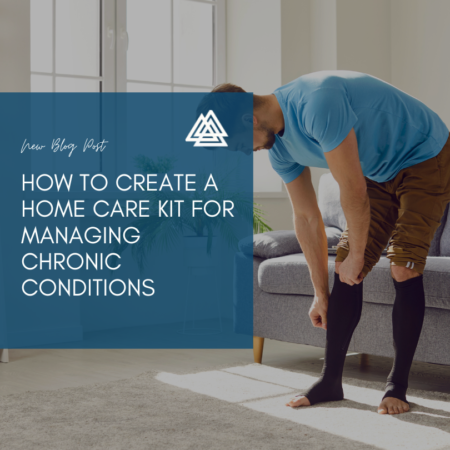 Managing a chronic condition like diabetes, lymphedema, or mobility challenges requires preparation and access to the right tools at home. Having a well-stocked home care kit can make managing daily needs easier and provide peace of mind for both patients and caregivers. Here’s a comprehensive checklist to help you create your own home care kit tailored to your specific needs.
Managing a chronic condition like diabetes, lymphedema, or mobility challenges requires preparation and access to the right tools at home. Having a well-stocked home care kit can make managing daily needs easier and provide peace of mind for both patients and caregivers. Here’s a comprehensive checklist to help you create your own home care kit tailored to your specific needs.
Essentials for Managing Diabetes
Blood Glucose Monitor and Test Strips:
A reliable glucometer to track blood sugar levels accurately.
Lancets and Lancing Device:
For safe and hygienic blood sampling.
Logbook or Digital App:
To track blood sugar readings, diet, and medication schedules.
Fast-Acting Glucose:
Items like glucose tablets or gel to treat hypoglycemia quickly.
Insulin and Syringes/Pens:
If prescribed, ensure you have the necessary supplies and storage (like a cooling case).
Alcohol Swabs:
For cleaning the skin before testing or injecting insulin.
Compression Socks:
To improve circulation and reduce the risk of swelling and foot complications.
Foot Care Tools:
Include a mirror for checking the soles of your feet, a nail clipper, and moisturizing cream to prevent dryness.
Emergency Contact Numbers:
A list of healthcare providers, including your endocrinologist and local pharmacy.
Essentials for Managing Lymphedema
Compression Garments:
Include gradient compression sleeves or stockings to help reduce swelling and improve circulation.
Moisturizing Cream:
To keep skin hydrated and prevent cracking or infections.
Lymphedema Pump (if prescribed):
For at-home therapy to reduce fluid buildup.
Bandages and Wraps:
Used during decongestive therapy to support fluid drainage.
Exercise Equipment:
Resistance bands or light weights for recommended exercises to promote lymphatic flow.
Skincare Supplies:
Antibacterial soap and non-fragranced lotions to protect sensitive skin.
Foam Rollers or Massagers:
To assist with lymphatic drainage and relieve tension.
Cold Packs:
To reduce swelling and provide comfort during flare-ups.
Essentials for Managing Mobility Issues
Walker, Cane, or Crutches:
Ensure mobility aids are properly fitted and in good condition.
Grabber Tool:
For picking up items without straining or bending.
Transfer Bench or Shower Chair:
To ensure safety and comfort during bathing.
Slip-Resistant Mats:
Place them in the bathroom and other high-risk areas to prevent falls.
Supportive Braces:
For knees, wrists, or ankles as recommended by your healthcare provider.
Wheelchair or Scooter (if needed):
Keep it maintained and charged if powered.
Reacher or Dressing Aids:
Tools like sock aids or button hooks to simplify daily dressing.
Pill Organizer:
To keep medications sorted and ensure proper dosing.
General Items for All Chronic Conditions
First Aid Kit:
Include bandages, antiseptic wipes, and gauze for minor injuries.
Blood Pressure Monitor:
For regular tracking of cardiovascular health.
Notebook or Planner:
To track appointments, medication schedules, and daily symptoms.
Hygiene Supplies:
Disposable gloves, hand sanitizer, and disinfecting wipes.
Backup Power Supply:
For essential medical devices in case of a power outage.
Comfort Items:
Include pillows, blankets, or a heating pad for added support and relaxation.
Organizing Your Home Care Kit
Use a Storage System: Keep items in labeled bins or a dedicated cabinet for easy access.
Create a Portable Kit: Use a tote bag or small box for essential items you need on the go.
Review Regularly: Check expiration dates and restock items as needed.
Take Control of Your Health
A well-prepared home care kit can make managing chronic conditions more convenient and less stressful. By having the right tools and supplies on hand, you’ll be ready to address daily needs and respond to potential issues quickly.
Explore Prism range of services and products to support your home care needs at https://www.prism-medical.com. With the right preparation, you can take charge of your health and enjoy greater peace of mind.
